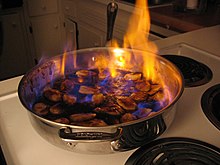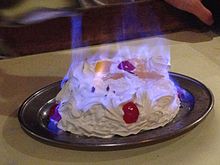Flambé
Flambé (UK: /ˈflɑːmbeɪ, ˈflɒ̃-/, US: /flɑːmˈbeɪ/,[1][2] French: [flɑ̃be]; also spelled flambe) is a cooking procedure in which alcohol is added to a hot pan to create a burst of flames.
[3] Flambéing is often associated with the tableside presentation of certain liqueur-drenched dishes set aflame, such as Bananas Foster or Cherries Jubilee when the alcohol is ignited and results in a flare of blue-tinged flame.
However, flambéing is also a step in making coq au vin and other dishes and sauces, using spirits before they are brought to the table.
[4] The most common flambé dish appears to have been sweet omelette with rum or kirsch; for example, Alexis Soyer's 1846 cookbook, The Gastronomic Regenerator, gives a recipe for Omelette au Rhum: "...the moment of going to table pour three glasses of rum round and set it on fire".
[5] Ida Joscelyne's book, The Marvellous Little Housekeepers (1880), mentions both rum and kirsch;[6] another recipe appears in A.G. Payne's English cookbook, Choice Dishes at Small Cost, of 1882: "Make a sweet omelet, and heat a tablespoonful of kirsch, by holding a light under the spoon.



